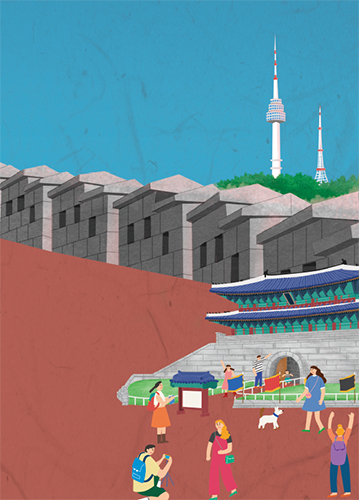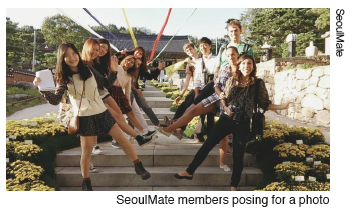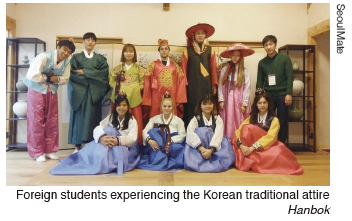
As Korea is gradually taking up a larger role in international relations and becoming ever-more global, it is showcasing itself as a hub for motivated youths from all edges of the world seeking prestigious university education. The University of Seoul (UOS), among all others, is one of the most preferred destination universities for undergraduate studies and for this reason the university has tried to come up with diverse programs to help out these students adapt to Korean culture. Therefore, The UOS Times would like to introduce one buddy program, “Seoulmate.” We have interviewed the vice-president of the UOS branch of SeoulMate, Sang-been Suk. The interview contents are as follows:
Q. Give us a brief introduction of SeoulMate.
A. Being a compound word of both “Seoul” and “Mate,” SeoulMate operates under the slogan, “When you meet Seoul, SeoulMate!” It is a nationwide university volunteer corps, which means that the program exists at other universities as well, and is also one of UOS’s buddy programs, where its main goal is befriending foreign students and introducing Seoul in a new light to them. Simply put, Korean students get the chance to help foreign students studying at their universities adapt to the Korean way of life, while at the same time exchanging cultural backgrounds.
Q. How long has SeoulMate been active?
A. The framework of SeoulMate first came about back in 2008, when three Korean university students came up with the idea of offering free tours to foreign students around Seoul. The first batch of SeoulMate was initiated in 2012, where each batch changes every one semester. We are currently in our 16th batch.
Q. What do you think foreign students have most difficulty in when adapting to Korea, and how does SeoulMate help tackle their problems?
A. Whichever country foreign students come from, it is an indisputable fact that every single one of them will inevitably face problems ranging from eating to finding affordable housing. Therefore, we literally try to help these students who face all sorts of hardships that come from studying within the bustling city of Seoul. For example, it can be those little things such as giving them a hand in purchasing SIM cards, teaching them Korean, or engaging in group activities. The ultimate purpose lies in allowing these students to quickly assimilate to our culture through these types of intercultural exchange. However, this does not mean that we answer to every single favor they ask for. We purely interact with them as buddies to bond and to reveal to them the hidden treasures of Seoul.


Q. Who is the main sponsor of SeoulMate?
A. Since SeoulMate is a nationwide university volunteers corps and not a campus organization administered by an individual university, it consists of branch associations managed by respective universities. Therefore, in respect to the SeoulMate program offered at our university, the UOS Institute for International Education is our financial backer. Apart from that, it is run by the donations made by both our volunteers and foreign students.
Q. What is your personal opinion of SeoulMate?
A. SeoulMate allows you to gain an experience you cannot get elsewhere! It is not easy to find an intercultural exchange program with foreign students systematically intact as that of UOS. It is purely an opportunity opened only to our students, and therefore it is my wish that many would take up the challenge to sign up for our program as future volunteers!
Q. Is there any last word you would like to add for successful candidates of SeoulMate?
A. I ask that all successful candidates of SeoulMate conduct future activities with a sense of pride. As I stated earlier, it really is something you cannot experience elsewhere. As a last note, you all were selected as final members, which means you already have the competence and capability to thrive, so do have self-pride.
The world is changing at a pace hitherto unseen. If the past few centuries were dominated by sovereignty and national interest, the 21st century demands integration, cooperation, and mutual coexistence among countries, multinational corporations, and individuals. However, even though Korea stands at the beginning stage of multiculturalism, it has at times neglected its outreach to foreigners residing in the country. We must remind ourselves that if we truly strive for our future generation in becoming global citizens, good welfare and service to these foreigners is tantamount to not only fostering domestic harmony and peace but also raising our international status as a melting pot. SeoulMate offers a good stimulus in this matter.
Chi Hyo-lim
prideme95@uos.ac.kr

